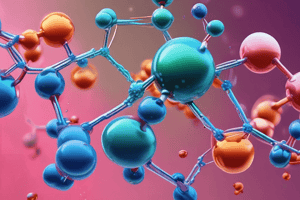Podcast
Questions and Answers
د بلاک کیمیا دے جدول کیسے گروہ مہملہ دیں؟
د بلاک کیمیا دے جدول کیسے گروہ مہملہ دیں؟
- 1 تو 12 (correct)
- 1 تو 3
- 14 تو 17
- 13 تو 18
د بلاک دھاتیں کس طرح دے خصوصیات رکھدیاں نیں؟
د بلاک دھاتیں کس طرح دے خصوصیات رکھدیاں نیں؟
- ایک منگنیشیم نمبر دے ساتھ
- فصلی حالتان
- پوری طرح دے s-مصلحت
- پوری طرح دے d-مصلحت (correct)
لانتھانائیڈ دھاتاں دے کمیکل خصوصیات کنے کھٹرا ہوئے نیں؟
لانتھانائیڈ دھاتاں دے کمیکل خصوصیات کنے کھٹرا ہوئے نیں؟
- اختتامی جوڑ
- معمولی شعاع
- ایکسٹرا فاز
- الٹرا وٹسن (correct)
کمپیوٹر اینائیڈ دھاتاں دے خصوصیات کس طرح دیاں نیں؟
کمپیوٹر اینائیڈ دھاتاں دے خصوصیات کس طرح دیاں نیں؟
کوؤٹھن ھۇن وٹہٖ طرح وٹٖہ چُنِ نہیں؟
کوؤٹھن ھۇن وٹہٖ طرح وٹٖہ چُنِ نہیں؟
کوٹرنیشَن کمپلیکس وچ، بندوٗ اُر کالر فراہم کرون والے چوتھے لیگیند کون ھے؟
کوٹرنیشَن کمپلیکس وچ، بندوٗ اُر کالر فراہم کرون والے چوتھے لیگیند کون ھے؟
کوؤریشَن اِنھِبِٹرون چ کُن طرح دا عمل کردا ہوۓ؟
کوؤریشَن اِنھِبِٹرون چ کُن طرح دا عمل کردا ہوۓ؟
تحوِلات چ میند ویران گِت، فلز دے سطح نوں حفاظت فراہم کردیندا، تُس حالات چ جذب کردیندا، اُتّے فلز دا دَباب گَئپ، اّتے میند اُتّے حفاظت فراهم کردیندا؟
تحوِلات چ میند ویران گِت، فلز دے سطح نوں حفاظت فراہم کردیندا، تُس حالات چ جذب کردیندا، اُتّے فلز دا دَباب گَئپ، اّتے میند اُتّے حفاظت فراهم کردیندا؟
Flashcards are hidden until you start studying
Study Notes
D and F Block Chemistry in Class 12 CBSE Boards: A Comprehensive Guide
As we dive into the fascinating world of D and F block elements in your Class 12 CBSE chemistry curriculum, we'll explore transition metals, lanthanides, actinides, coordination compounds, and oxidation states. This article aims to provide a fact-rich, yet easy-to-understand guide to help you excel in your studies.
Transition Metals (D Block)
Transition metals, located in group 3 to 12 of the periodic table, are characterized by their ability to form multiple oxidation states and possess unique properties due to their partially filled d orbitals. Some common transition metals include:
- Iron (Fe)
- Cobalt (Co)
- Nickel (Ni)
- Copper (Cu)
- Zinc (Zn)
Transition metals play a significant role in catalysis and form the basis of many essential materials, such as alloys and pigments.
Lanthanides (F Block)
The F block elements, known as lanthanides, are a series of 15 elements, from Lanthanum (La) to Lutetium (Lu). These elements are characterized by their unique electronic configuration, displaying the filling of the 4f orbitals. Lanthanides have similar chemical properties, but their physical properties vary significantly due to the inert pair effect.
Actinides (F Block)
The actinides, consisting of 15 elements from Actinium (Ac) to Lawrencium (Lr), are a subset of the F block elements. They are characterized by their ability to undergo radioactive decay, making them unstable and radioactive. Actinides are often used in nuclear reactors and contribute to the nuclear fuel cycle.
Coordination Compounds
Coordination compounds, also known as complexes, consist of a central metal atom or ion surrounded by ligands (such as ions or molecules) that donate electron pairs to the central metal atom. Coordination compounds demonstrate unique properties and applications, such as:
- Colorful pigments
- Catalysts
- Corrosion inhibitors
- Magnetic materials
Oxidation States
Oxidation states represent the number of electrons an atom gains or loses when it forms a chemical bond. In transition metals, oxidation states can be positive, negative, or zero depending on the number of electrons lost or gained by the metal. Lanthanides and actinides typically have specific oxidation states and prefer to lose electrons to achieve stability.
For instance:
- Iron (Fe) has oxidation states from +2 to +3.
- Cobalt (Co) has oxidation states from +2 to +4.
- Lanthanum (La) typically has an oxidation state of +3.
By understanding the concepts of transition metals, lanthanides, actinides, coordination compounds, and oxidation states, you'll develop a solid foundation for your study of D and F block chemistry in Class 12 CBSE boards. Remember to always focus on the details, as the nuances of these elements play a vital role in understanding their respective properties and applications. Happy studying!
Studying That Suits You
Use AI to generate personalized quizzes and flashcards to suit your learning preferences.




